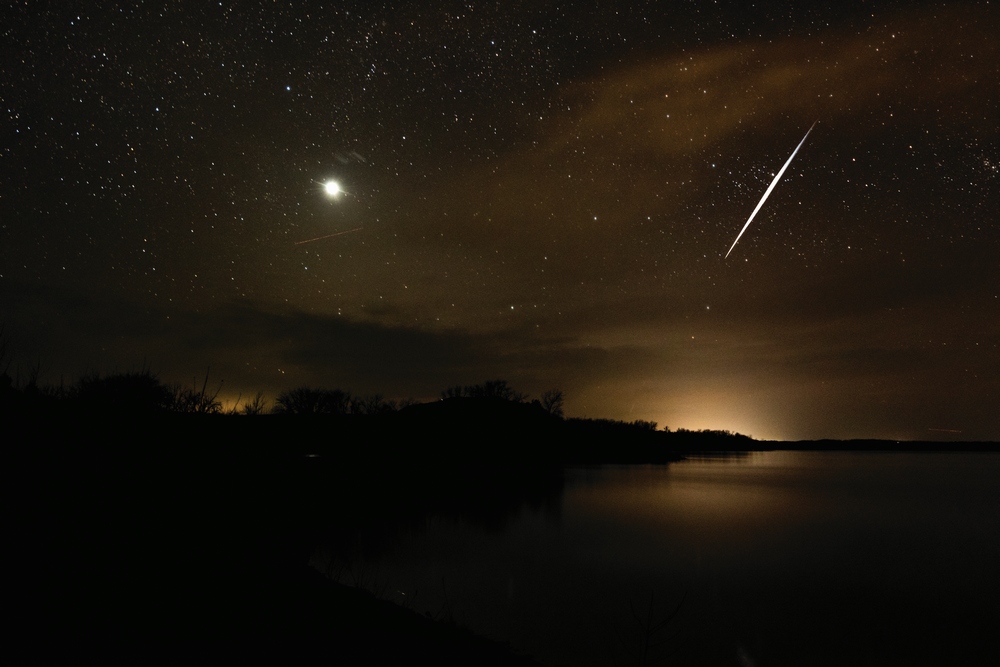![]()

By Renae Blum
Night sky admirers have many celestial marvels to look forward to this fall, and one of the best places to catch them will be at Nebraska’s more than 70 state parks.
From comets to meteor showers, state parks across Nebraska — particularly those in the western part of the state — will provide dark skies perfect for viewing the dazzling displays. One of them, Merritt Reservoir State Recreation Area, was even named an International Dark Sky Park in 2022.
Find a state park near you at OutdoorNebraska.gov and then get ready for stargazing opportunities this October, November and December. Viewing opportunities will be fairly good this time of year, said Jim Kvasnicka of Lincoln, of the Prairie Astronomy Club.
A comet visible to the naked eye
The real highlight this fall may be a comet lighting up the sky in October. Called Comet Tsuchinshan-ATLAS, it could become visible to the naked eye — something that rarely happens, Kvasnicka said.
“Most comets, you need to use a good pair of binoculars or a telescope to see them. If this one is as bright as they say it is, you’ll be able to see it naked eye, which would be wonderful,” he said. “Those don’t happen that often.”
However, comets are notoriously unpredictable. Some have “fizzled out” despite strong predictions, so keep an eye on the news and websites like Sky & Telescope for updates, he said. If predictions hold up, the comet should be visible low in the west after sunset starting Oct. 11.
A planet shines brighter
Another opportunity will be less unpredictable. The planet Venus is starting to appear again as an evening planet, shining brightly in the west. It will continue to move higher in the sky as we approach the end of the year.
“It’s very bright and you can’t miss it,” Kvasnicka said. “Venus is actually the brightest object in the night sky, other than the moon.”
This is due to its closeness to Earth, as well as its cloudy atmosphere, which acts like a mirror to reflect sunlight, he said.
Meteor showers dazzle each month
Several meteor showers will take place in the coming months, as well. The Orionid meteor shower will peak the night of Oct. 20-21, with possibly up to 20 meteors per hour. However, the waning gibbous moon will be visible, its brightness interfering with your viewing, Kvasnicka said.
Viewers can hope for better luck with the Leonids, which peaks Nov. 17-18. It’s a modest shower, producing maybe 15 meteors an hour.
The real show is expected to come in December, with the Geminids. One of the best meteor showers of the year, it can produce up to 75 meteors per hour.
“If you get to a nice dark site, and don’t mind sitting out in the cold, you’ll see a lot of meteors,” Kvasnicka said.
The best viewing will be after midnight on Dec. 13-14, if clouds or haze from wildfires don’t interfere. Kvasnicka advises dressing warm and bringing anything that will make you comfortable, like a lawn chair or a mug of hot cocoa or coffee.
Simply enjoy the night sky
Simply sitting and watching the stars, even without meteors shooting by, can be fun in the fall and winter months. Especially in the winter, the air is drier and less humid, making objects appear crisper to the eye.
“If you look at the stars in the summer months, a lot of times they appear to be twinkling quite a bit,” Kvasnicka said. “If you look at them in the winter, they don’t twinkle near as much because the atmosphere is a lot more steady. It makes seeing a lot better.”
For most of these opportunities, special equipment isn’t needed. Binoculars are nice to have when viewing comets, Kvasnicka said, but Venus will be quite visible without it, and meteors are difficult to watch with binoculars.
Watching the night sky is a great way to relax, connect with nature and spend time with people you care about. Cap off a day at a Nebraska state park enjoying activities like hiking, camping, fishing and wildlife watching by waiting for evening to fall.
And then take in incredible sights like these.
